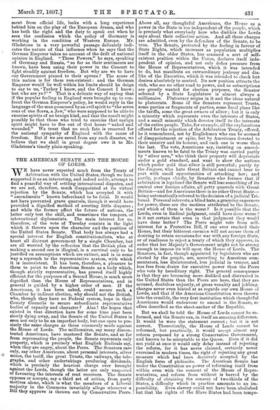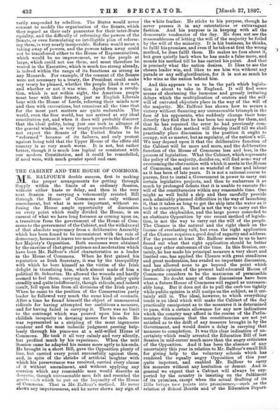1.11.6 AMERICAN SENATE AND THE HOUSE OF LORDS.
WE have never expected much from the Treaty of Arbitration with the United States, though we have supported it as an interesting, and indeed noble, attempt to find a peaceful way of settling international disputes, and we are not, therefore, much disappointed at its virtual rejection by the Senate, which has accepted it with " amendments " known beforehand to be fatal. It would not have prevented grave quarrels, though it would have provided a dignified method of averting little disputes ; and while the former affect the future of nations, the latter only test the skill, and sometimes the tempers, of international diplomatists. The main interest for us, therefore, of the vote of Tuesday consists in the light which it throws upon the character and the position of the United States Senate. That body has always had a special interest for English constitutionalists, who at heart all distrust government by a single Chamber, but are all worried by the reflection that the British plan of making a second one is illogical, is a survival only to be justified on assumptions which are extinct, and is in some way a reproach to the representative system, with which it is inconsistent. It has been, therefore, a pleasure to them to point to the American Senate as a body which, though, strictly representative, has proved itself highly efficient for the purposes of a Second House, is much more dignified than the House of Representatives, and in general is guided by a higher order of men. If the Americans, it has been asked, could secure such a Chamber by indirect election, why should not the British, who, though they have no Federal system, hope in their County Councils to secure subordinate representative bodies of capacity and character ? Alas ! the hopes that existed in that direction have for some time past been slowly dying away, and the Senate of the United States is seen not only to be an imperfect body, but one open to pre- cisely the same charges as those commonly made against the House of Lords. The millionaires, say many discon- tented Americans, have mastered the Senate, and so far from representing the people, the Senate represents only property, which is precisely what English Radicals say, when they are angry, about the Peers. The Senators care only, say other Americans, about personal interests, silver 4 minee, the tariff, the great Trusts, the railways, the tele- graphs, and other undertakings producing dividends, which is precisely the heaviest charge ever brought against the Lords, though the latter are only suspected of favouring the interests of rent receivers. The Senate opposes or accepts, say a third set of critics, from party motives alone, which is what the members of a Liberal majority in the Commons invariably allege whenever a Bill they approve is thrown out by Conservative Peers. Above all, say thoughtful Americans, the House as a power in the State is too independent of the people, which is precisely what everybody here who dislikes the Lords says about their collective action. And all these charges are admitted, even by the defenders of the Senate, to be true. The Senate, protected by the feeling in favour of State Rights, which increases as population multiplies itself in the older States, has assumed a sort of self- existent position within the Union, declares itself inde- pendent of opinion, and not only defies pressure from the House of Representatives, which it was intended to do, but manifests an extraordinary jealousy and dis- like of the Executive, which it was intended to check but desires absolutely to control. Its new position attracts the rich, who see no other road to power, and as subscriptions are greatly wanted for election purposes, the Senator selected by a State Legislature is almost always a millionaire. Plutocracy reigns in it and the ideas natural to plutocrats. Some of the Senators represent Trusts, some parties or fragments of parties, some fiscal plans like the tariffs, some the great owners of silver ; but it is only a minority which represents even the interests of States, and a small minority which devotes itself to the interests of the entire people. Take, for example, all the explanations offered for the rejection of the Arbitration Treaty, offered, be it remembered, not by Englishmen who can be accused of disappointment or spite, but by Americans devoted to their country and its honour, and each one is worse than the last. The vote, Americans say, insisting on amend- ments known to be fatal to the Treaty was carried partly by "silver men," who think their property will depreciate under a gold standard, and want to show the nations which prefer gold that silver is still powerful ; partly by the Jingoes, who hate Great Britain and cannot bear to part with small opportunities of attacking her; and partly, perhaps chiefly, by Senators who foresee that if arbitration is legalised the Senate will lose something of its control over foreign affairs, all petty quarrels with Great Britain—and for Americans there is no other Great State— being automatically referred to the decision of a judicial Tri- bunal. Personal interests, a blind hate, a grasping eagerness for power, these are the motives attributed to the Senate, and which of them is the worst? Is it possible that the Lords, even in Radical judgment, could have done worse ? is it not certain that even in that judgment they would have done better ? The Peers might vote from self- interest for a Protective Bill, if one ever reached their House, but their bitterest enemies will not accuse them of desiring to retain occasions for war with any foreign State, or of readiness to reject a treaty of which they approve, in order that her Majesty's Government might not be strong enough to impose its will upon the House of Lords. The Senators, in fact, though appointed by legislators who are elected by the people, are, according to American com- mentators, less disinterested, less judicial in temper, and less free from desire for executive power than the Peers who vote by hereditary right. The general consequence is that they are becoming more disliked and distrusted in the United States than the Peers are here, that they are accused, doubtless unjustly, of gross venality and jobbing. charges never even hinted at as regards our own House of Lords, and that if the American Constitution were thrown into the crucible, the very first institution which thoughtful Americans would endeavour to amend is the Senate, so often described as the sheet-anchor of the Republic.
But we shall be told the House of Lords cannot be re- formed, and the Senate can, in itself an amazing difference. It would be were the statement correct ; but it is not correct. Theoretically, the House of Lords cannot be reformed, but practically, it would accept almost any reform proposed by a strong Conservative Government, and known to be acceptable to the Queen. Even if it did not yield at once it would only delay instead of rejecting the reform, for it has never claimed, . certainly never exercised in modern times, the right of rejecting any great measure which had been decisively accepted by the English form of plebiscite. The American Senate has under the Constitution no power of reforming itself from within even with the consent of the House of Repre- sentatives, and reform from without is barred by the difficulty of obtaining the consent of two-thirds of the States, a difficulty which in practice amounts to an im- possibility. Even slavery could not have been abolished but that the rights of the Slave States had been tempo- rarity suspended by rebellion. The States would never consent to modify the organisation of the Senate, which they regard as their only guarantee for their inter-State equality, and the difficulty of reforming the powers of the Senate, or even formulating an intelligible plan of reform- ing them, is very nearly insuperable. Reform would mean a taking away of powers, and the powers taken away could not be transferred either to the House of Representatives, which would be no improvement, or to the people at large, which could not use them, and must therefore be vested in the Executive, which is much too strong already, is indeed within the range of its functions as strong as any Monarch. For example, if the consent of the Senate were not necessary to a treaty, the President could make any treaty he pleased, whether the people liked it or not, and whether or not it was wise. Apart from a revolu- tion, which is not within sight, the American people must bear with their Senate, just as English Liberals bear with the House of Lords, relieving their minds now and then with execrations, but conscious all the time that for the most part matters are quite endurable. The world, even the free world, has not arrived at any ideal constitution yet, and when it does will probably discover that the ideal polity, being just one inch in advance of the general wisdom, is very nearly unendurable. We do not expect the Senate of the United States to be " reformed " because of its failures, and only protest against being told that the Upper House of the effete old country is so very much worse. It is not, but rather better, though it is much less logical or consistent with our modern Constitution, and it could be remodelled, if need were, with much greater speed and ease.







































 Previous page
Previous page